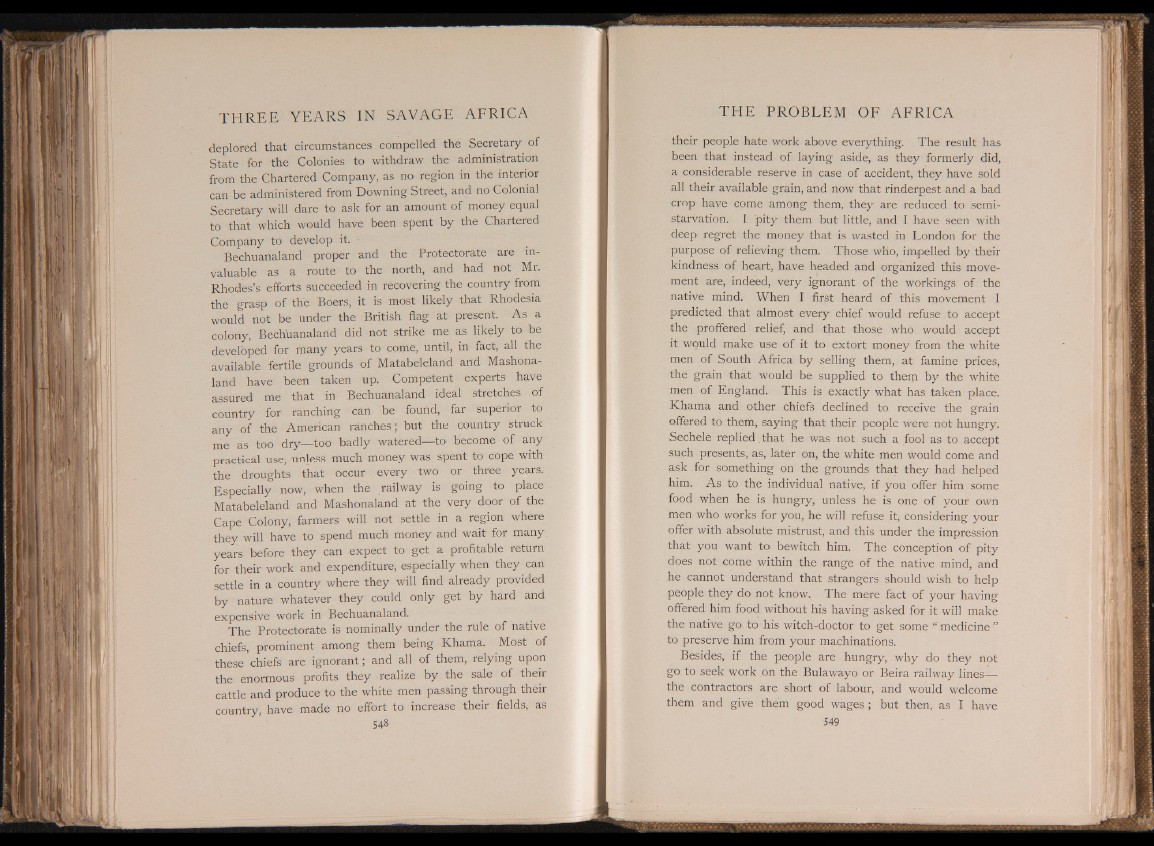
deplored that circumstances compelled the Secretary of
State for the Colonies to withdraw the administration
from the Chartered Company, as no region in the interior
can be administered from Downing Street, and no Colonial
Secretary will dare to ask for an amount of money equal
to that which would have been spent by the Chartered
Company to develop it. ■
Bechuanaland proper and the Protectorate are invaluable
as a route to the north, and had not Mr.
Rhodes’s efforts succeeded in recovering the country from
the grasp of the Boers, it is most likely that Rhodesia
would not be under the British flag at present. As a
colony, Bechuanaland did not strike me as likely to be
developed for many years to come, until, in fact, all the
available fertile grounds of Matabeleland and Mashona-
land have been taken up. Competent experts have
assured me that in Bechuanaland ideal stretches of
country for ranching can be found, far superior to
any of the American ranches; but the country struck
me as too dry—too badly watered—to become of any
practical use, unless much money was spent to cope with
the droughts that occur every two or three years.
Especially now, when the railway is going to place
Matabeleland and Mashonaland at the very door of the
Cape Colony, farmers will not settle in a region where
they will have to spend much money and wait for many,
years before they can expect to get a profitable return
for their work and expenditure, especially when they can
settle in a country where they will find already provided
by nature whatever they could only get by hard and
expensive work in Bechuanaland.
The Protectorate is nominally under the rule of native
chiefs, prominent among them being Khama. Most of
these chiefs are ignorant; and all of them, relying upon
the enormous profits they realize by the sale of their
cattle and produce to the white men passing through their
country, have made no effort to increase their fields, as
548
their people hate work above everything. The result has
been that instead of laying aside, as they formerly did,
a considerable reserve in case of accident, they have sold
all their available grain, and now that rinderpest and a bad
crop have come among them, they are reduced to semistarvation.
I pity them but little, and I have seen with
deep regret the money that is wasted in London for the
purpose of relieving them. Those who, impelled by their
kindness of heart, have headed and organized this movement
are, indeed, very ignorant of the workings of the
native mind. When I first heard of this movement I
predicted that almost every chief would refuse to accept
the proffered relief, and that those who would accept
it would make use of it to extort money from the white
men of South Africa by selling them, at famine prices,
the grain that would be supplied to them by the white
men of England. This is exactly what has taken place.
Khama and other chiefs declined to receive the grain
offered to them, saying that their people were not hungry.
Sechele replied. that he was not such a fool as to accept
such presents, as, later on, the white men would come and
ask for something on the grounds that they had helped
him. As to the individual native* if you offer him some
food when he is hungry, unless he is one of your own
men who works for you, he will refuse it, considering your
offer with absolute mistrust, and this under the impression
that you want to bewitch him. The conception of pity
does not come within the range of the native mind, and
he cannot understand that strangers should wish to help
people they do not know. The mere fact of your having
offered him food without his having asked for it will make
the native go to his witch-doctor to get some “ medicine ”
to preserve him from your machinations.
Besides, if the people are hungry, why do they not
go to seek work on the Bulawayo or Beira railway lines—
the contractors are short of labour, and would welcome
them and give them good wages ; but then, as I have
549
■ ■ H I